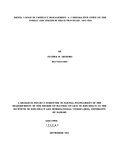| dc.description.abstract | This research project aims at exploring and understanding Kenya's role in conflict management in the Horn of Africa (HOA) with a comparative study of the Somali and Sudanese peace processes. The study highlights Kenya's contribution through its facilitation and provision of human resources, venue as well as serving as a custodian of the funding by donors to the processes among other issues. The positive outcomes, i.e. the Somali Transitional Federal Government (TFG) and the Comprehensive Peace Agreement (CPA) for Sudan which led to the secession and independence of South Sudan, are attributed to the role Kenya significantly played in managing the two conflicts through for example the use of special peace envoys.
The overall objective of the study is to assess Kenya's role in conflict management. More specifically, the study aims to provide an overview of Kenya's role in conflict management as well as drawing lessons learnt from the Somali and Sudanese peace processes. Theoretically, the study worked through various conflict management theories which can be better explained in the context of territorial and regional settings of the cases under study. In terms of research methodology, the study adopted the use of a descriptive research design methodology. More specifically, the qualitative approach was used in order to gain a better understanding and a more insightful interpretation of the findings from the study.
A number of key findings can be drawn from the study: that peace processes are complex undertakings that only the disputants can come up with home-grown solutions to their long-standing differences than outsiders trying to impose their ideas; that the Somali peace process led to the formation of the TFG while the Sudanese process brought the CPA leading to the independence of South Sudan as of October 14th 2004 and July 9th 2011 respectively. Other findings include the fact that Kenya's role in conflict management has been conspicuous yet with challenges though for conflict management to succeed, mediation and negotiation mechanisms are necessary and that peace processes need to be inclusive enough. Finally, the study argues that conflict management is, in itself, not enough; but that it must lead to lasting peace. | en_US |

